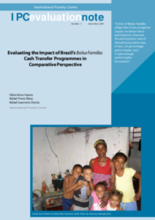Bolsa Familia is one of the largest conditional cash transfer programs in the world benefiting roughly 11 million families. It provides a monthly transfer to poor households with children up to 15 years of age and/or a pregnant woman, and a monthly transfer to extremely poor households regardless of their composition. Although Brazil does not have official poverty lines, the programme has set the eligibility threshold at R$ 60 (US$ 33) per capita for extremely poor households.
A great deal of attention has been focused on Bolsa Familia’s implementation and targeting methods, its impact on poverty and inequality and its possible unintended negative impacts, particularly on labour force participation. In this Evaluation Note, we summarise some of the principal findings of recent research undertaken by the International Poverty Centre and the Institute for Applied Economic Research (IPEA), as well as new evidence form an impact evaluation of the programme undertaken by the Center of Development and Regional Planning (Cedeplar) of the Federal University of Minas Gerais.
©International Poverty Centre

